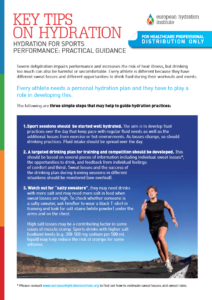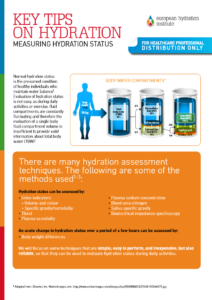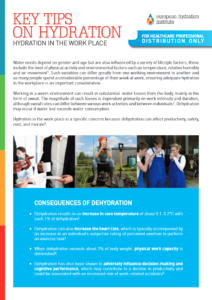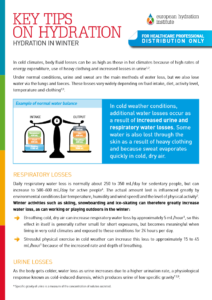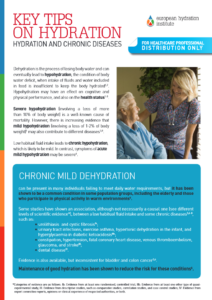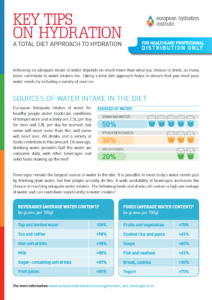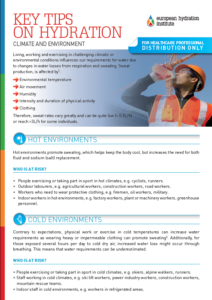Key Tips on Hydration
Hydration for sports performance
Severe dehydration impairs performance and increases the risk of heat illness, but drinking too much can also be harmful or uncomfortable. Every athlete is different because they have different sweat losses and different opportunities to drink fluid during their workouts and events. In this latest edition of “Key Tips on Hydration” we provide you with advice on how to guide your hydration practices, as well as how to monitor your sweat losses and the success of your drinking plan when practising sports.
Measuring hydration status
Evaluation of hydration status is not easy, as during daily activities or exercise, fluid compartments are constantly fluctuating, so measuring a single body fluid is insufficient to provide valid information about total body water. In this new issue we present some of the methods used to measure hydration status and focus on those that are simple easy to perform and reliable ways for healthy adults to evaluate hydration status during daily activities.
Hydration in the workplace
Hydration in the work place is a specific concern because consequences of dehydration, even mild, can affect productivity, safety, cost, and morale. In this new issue the consequences of dehydration on physical and cognitive work capacity are described, and practical tips about staying hydrated in the work place are provided.
Hydration while studying
Adequate hydration is important for optimal functioning of the brain. Dehydration can adversely influence cognitive function, and this is important when considering tasks such as studying. In this new issue the consequences of dehydration on cognitive performance are reviewed, and practical tips for staying hydrated when facing cognitive tasks are provided.
Hydration in winter
In cold weather conditions, body fluid losses can be as high as those in hot climates because additional water losses occur as a result of increased urine and respiratory water losses. In this new issue the additional water losses during cold weather are reviewed, and practical tips for staying hydrated in winter are provided.
Hydration and chronic diseases
Chronic mild dehydration can be present in many individuals failing to fulfil daily water requirements, but it has been shown to be a common condition in some population groups, including the elderly and those who participate in physical activity in warm environments. In this new issue the effects of chronic mild dehydration are reviewed, and practical tips to maintain a good hydration status are provided.
